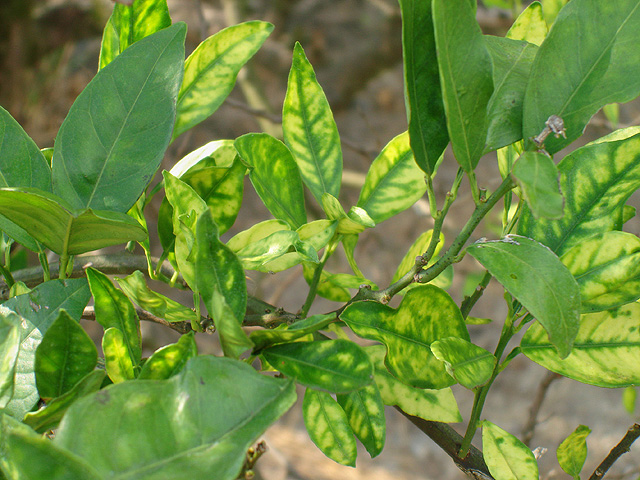
Bt to Help Combat Devastating Citrus Greening Disease
January 15, 2025| |
Scientists at the University of Florida Institute of Food and Agricultural Sciences (UF/IFAS) are testing a new type of genetically edited citrus tree that can fight off Asian citrus psyllids, the insects responsible for citrus greening disease, also known as Huanglongbing (HLB). The modified tree was developed in the lab and greenhouse and will soon be tested in the field.
The scientists inserted a gene from the soil-borne bacterium Bacillus thuringiensis (Bt) into a citrus tree that produces a protein that can kill baby Asian citrus psyllids. The gene yields a protein in the phloem, the vascular part of a leaf where the psyllid feeds. The UF/IFAS research team found that the protein derived from Bt can kill the vast majority of the psyllids in their earliest stages. No new adults can emerge on the tree, so adults laying eggs on these plants will not perpetuate the population.
Since 2005, HLB has damaged most of the citrus trees in Florida, including the fruit they bear, leaving growers and scientists seeking answers to the disease. “Given the widespread use of Bt proteins for protection of other crops against insect pests, we think we're on the right track for control of the Asian citrus psyllid,” said Bryony Bonning, an eminent scholar and entomology professor on the main UF campus in Gainesville, who led the research to identify the bacterial proteins that kill psyllids.
Read more details in University of Florida News.
| |
You might also like:
- Genome of Australian Round Lime Reveals Key to Citrus Greening Resistance
- Researchers Find Peptide that Treats and Prevents Citrus Greening
- Gene Editing Provides Possible Solution to Citrus Greening Disease
Biotech Updates is a weekly newsletter of ISAAA, a not-for-profit organization. It is distributed for free to over 22,000 subscribers worldwide to inform them about the key developments in biosciences, especially in biotechnology. Your support will help us in our mission to feed the world with knowledge. You can help by donating as little as $10.
-
See more articles:
-
Plant
- PhilRice Study Pinpoints Low-GI Rice Varieties for Diabetics
- Gene-silencing Spray to Fight Fusarium Head Blight in Cereal Crops
- Expected Profitability and Perception Drive Farmer’s Participation in GM Crop Farming
- Bt to Help Combat Devastating Citrus Greening Disease
-
Animal
- CSIRO and Oxitec to Target Invasive Pests Across Australia and Oceania
-
Food
- 153 Nobel and World Food Prize Laureates Issue Urgent Wake-Up Call Over Hunger Tipping Point
-
Health
- Survey Shows Public Sentiment on Microbiome Engineering
-
Environment
- Genomes of Alopecurus Grasses Shed Light on Weed Resistance
-
Read the latest: - Biotech Updates (February 18, 2026)
- Gene Editing Supplement (January 28, 2026)
- Gene Drive Supplement (February 22, 2023)
-
Subscribe to BU: - Share
- Tweet

